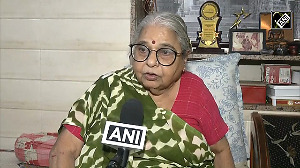
There is a worry in the Pakistan camp that the Indians might not be susceptible to reverse swing. The way they played in Australia, it was apparent that they knew what the ball would do. It might still be a mystery for teams like England and South Africa. But that doesn't seem to be the case with the Indians.
We in Pakistan are very good at "caring" for the ball. We make sure that at least one side of the ball retains its shine. After 30-40 overs, the dry conditions of our subcontinent help the ball to reverse. When Wasim Akram and Waqar Younis operated, we tried our best to ensure that the ball didn't get wet or that too much of sweat was not applied on it.
I remember the Old Trafford Test of 2001 when sweat on the hands of Saqlain Mushtaq didn't allow the ball to dry up enough. Saqlain usually sweats a lot. In order to counter it, and to make sure our fast bowlers got their way, he used to apply a cream to keep his hands dry.
These days I am speaking a lot to Shoaib Akhtar and Mohammad Sami, who, incidentally, is from my academy, about the plans they should hatch against the Indian batsmen. Most of the Indian batsmen are greats, but everyone has faults. As a coach, you must look at the current faults of batsmen. Sachin Tendulkar for instance does not have a long stride forward and any delivery which comes in quickly from a good length spot, he tends to inside-edge on to his stumps.
Tendulkar of course is a genius and I will never forget his double century in Sydney. He clearly was struggling with his form. He had been dismissed a few times driving on the off-side. He cleverly took the centre rather than the off-stump guard. It allowed him to walk on to his off-stump and any deliveries pitched on middle and leg were worked on the onside beautifully.
| |||||||||||
Now of course it would be Shoaib to start our operations. He is the fastest bowler in the world and he now also has good focus. He is bowling as well with the new ball as he did during the 1999 World Cup. I have been telling him to avoid verbal intimidation and rather let his deeds do the talking.
Let's admit that Shoaib is the glamour boy of international cricket. He knows that when he is on the field everyone expects him to strike all the time. He actually enjoys the attention and is known to take four or five wickets -- if the rhythm is right -- in a matter of a dozen balls.
Mohammad Sami is not as quick as Shoaib, but in terms of consistent speed he is perhaps the best in Pakistan. He regularly bowls in excess of 145 kmph. He is very quick off the pitch. England captain Michael Vaughan acknowledges him to be the fastest off the pitch. New Zealand batsmen had no clue to his pace. He can also indulge in verbal intimidation. Actually a lot of young bowlers do it as we saw Irfan Pathan and Brad Williams indulge in it in Australia. Shoaib does not do much talking, but he has his own mannerisms and style.
Shabbir Ahmed restricts his menace to his pace alone. He is back from his correctives in Australia and he has pace and bounce which he extracts from his unusual height. The good thing with these three S's is that all are different and bring their own sets of problems for batsmen. Shoaib, Sami and Shabbir are different, but all are hostile and genuinely quick.
Rana Naved-ul-Hasan is a youngster who made his debut under my captaincy in Sharjah but was dropped for Sri Lanka, because of which I had a showdown with Aamir Sohail, then chairman of selectors.
He is a very decent prospect, his pace is better than that of Abdur Razzaq and Azhar Mahmood, and he is a very good exponent of reverse swing. He is also a very good batsman. A very steady cricketer who could be a help to the team in more than one area.
All these fast bowlers will be aggressive, but then they must not sacrifice control. Aggression and accuracy are both important. That's how you build pressure on batsmen. The Indian batsmen are good enough to plunder loose bowling.
Also, let us not presume that all the pressure is on the Indian team. If anything, members of the Pakistani team will face stiffer pressure. You walk on to the field, go out with friends, talk to friends or relatives, there is this constant pleading for you to do well in the series. When you are touring, you have less pressure.






